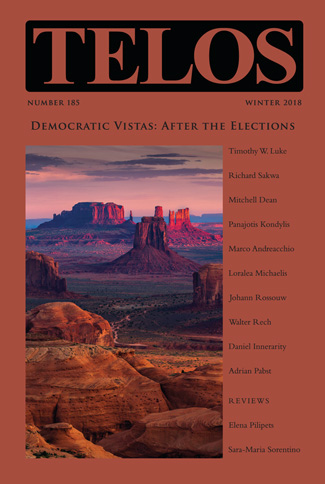Mitchell Dean’s “Oath and Office” appears in Telos 185 (Winter 2018). Read the full article at the Telos Online website, or purchase a print copy of the issue in our online store. Individual subscriptions to Telos are available in both print and online formats.
 The oath pertains to law, sovereignty, and office. A public servant takes an oath. A witness and a juror at a trial swear an oath. The British monarch swears a coronation oath and the president-elect of the United States an oath of office. While the coronation of the monarch has been regarded as “medieval” and the inauguration of the president as “ceremonial” or “symbolic,” it would be a mistake to view them as empty rituals, particularly the oaths taken. And while the oath invokes God, it would be an error to assume that it is merely an atavism, a retroversion, or a vestige of a more religious past. But what it is and what it does is far from clear, including to those who swear oaths. When President Obama, sworn in by Chief Justice John Roberts, misspoke his oath of office in January 2009, he was advised to retake it the next day, as the White House counsel put it, “out of an abundance of caution.” Ex abundanti cautela might indeed by the principle that scholars should adopt, given the thicket of false trails, unfathomable origins, prejudices, and commonplaces that afflict any attempt to study this practice. The appropriate method to study the oath uses multiple examples and cases, considers them from as many different viewpoints as it can, and remains wary of both our commonsense assumptions about its origins and efficacy and their theoretical correlates.
The oath pertains to law, sovereignty, and office. A public servant takes an oath. A witness and a juror at a trial swear an oath. The British monarch swears a coronation oath and the president-elect of the United States an oath of office. While the coronation of the monarch has been regarded as “medieval” and the inauguration of the president as “ceremonial” or “symbolic,” it would be a mistake to view them as empty rituals, particularly the oaths taken. And while the oath invokes God, it would be an error to assume that it is merely an atavism, a retroversion, or a vestige of a more religious past. But what it is and what it does is far from clear, including to those who swear oaths. When President Obama, sworn in by Chief Justice John Roberts, misspoke his oath of office in January 2009, he was advised to retake it the next day, as the White House counsel put it, “out of an abundance of caution.” Ex abundanti cautela might indeed by the principle that scholars should adopt, given the thicket of false trails, unfathomable origins, prejudices, and commonplaces that afflict any attempt to study this practice. The appropriate method to study the oath uses multiple examples and cases, considers them from as many different viewpoints as it can, and remains wary of both our commonsense assumptions about its origins and efficacy and their theoretical correlates.


